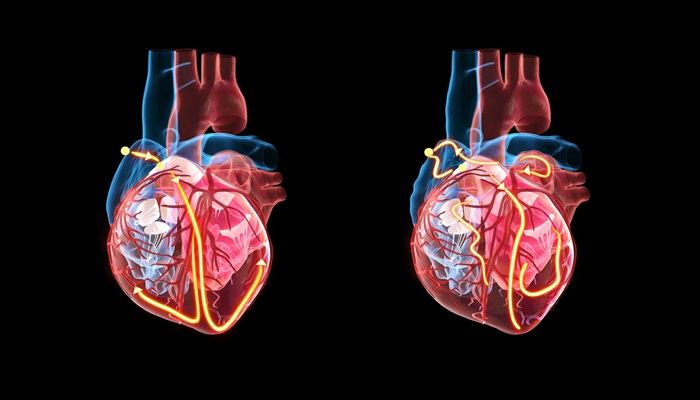Arrhythmia is a condition where the heart beats irregularly, either too fast, too slow, or in an erratic pattern. While it can be concerning, many people seek natural ways to manage this condition. Understanding how to address arrhythmia naturally involves lifestyle changes, dietary adjustments, and stress management techniques. In this article, we will explore these strategies in detail.
What Is Arrhythmia?
Before diving into natural remedies, it’s essential to understand what arrhythmia is and what causes it. The heart has an electrical system that regulates its rhythm. Disruptions in this system can lead to arrhythmias. Common types include atrial fibrillation, atrial flutter, and ventricular tachycardia.
Causes of Arrhythmia
Several factors can contribute to arrhythmia:
Heart Disease: Conditions like coronary artery disease can disrupt normal heart rhythms.
Electrolyte Imbalances: Low levels of potassium, magnesium, or calcium can affect heart function.
High Blood Pressure: Hypertension can lead to changes in the heart’s structure, causing arrhythmias.
Stress: Emotional stress can trigger irregular heartbeats.
Caffeine and Alcohol: Excessive intake of these substances can provoke arrhythmias.
Medications: Some drugs can affect the heart’s electrical system.
Symptoms of Arrhythmia
Symptoms can vary widely, but common signs include:
- Palpitations or a racing heart
- Dizziness or lightheadedness
- Shortness of breath
- Chest pain or discomfort
- Fatigue
If you experience these symptoms, it’s essential to consult a healthcare professional.
Natural Strategies to Manage Arrhythmia
While some arrhythmias require medical treatment, many can be managed or improved through natural methods. Here are several effective strategies:
1. Healthy Diet
A heart-healthy diet is crucial in managing arrhythmia. Focus on:
Fruits and Vegetables: Aim for a variety of colors to get a range of nutrients. Leafy greens, berries, and citrus fruits are especially beneficial.
Whole Grains: Foods like brown rice, quinoa, and oats can help maintain stable blood sugar levels.
Lean Proteins: Fish, chicken, and plant-based proteins such as beans and lentils provide essential amino acids without excess fat.
Healthy Fats: Include sources of omega-3 fatty acids like salmon, walnuts, and flaxseeds. These can help reduce inflammation and improve heart health.
see also: Why Does A Heart Attack Cause Arrhythmia?
Avoid:
Processed foods high in sugar and salt
Trans fats found in fried foods
Excessive caffeine and alcohol
2. Regular Exercise
Physical activity is vital for heart health. Aim for at least 150 minutes of moderate exercise per week. Activities like walking, cycling, swimming, or yoga can improve cardiovascular fitness and reduce stress.
Aerobic exercise strengthens the heart and improves blood flow.
Strength training can help manage weight and improve overall health.
Flexibility exercises like yoga can enhance relaxation and reduce stress.
3. Stress Management
Stress can trigger arrhythmias, so finding ways to manage it is essential. Consider:
Mindfulness and Meditation: These practices help calm the mind and reduce stress. Spending even a few minutes each day can be beneficial.
Deep Breathing Exercises: Focusing on your breath can help regulate your heart rate and reduce anxiety.
Progressive Muscle Relaxation: This technique involves tensing and relaxing different muscle groups to promote relaxation.
4. Maintain a Healthy Weight
Excess weight puts additional strain on the heart. If you’re overweight, losing even a small amount of weight can significantly improve heart health. Combine a healthy diet with regular exercise to achieve a sustainable weight loss plan.
5. Stay Hydrated
Hydration is crucial for overall health and can help maintain the balance of electrolytes. Aim to drink at least eight 8-ounce glasses of water daily. If you’re active or live in a hot climate, you may need more.
6. Monitor Electrolyte Levels
Electrolytes like potassium, magnesium, and calcium play a vital role in heart function.
Potassium: Found in bananas, oranges, and spinach, potassium helps regulate heartbeat.
Magnesium: Foods like nuts, seeds, and whole grains are rich in magnesium and can help maintain heart rhythm.
Calcium: Dairy products, leafy greens, and fortified foods provide calcium, which is essential for heart health.
7. Limit Caffeine and Alcohol
Caffeine and alcohol can provoke arrhythmias in some individuals. Consider reducing or eliminating these substances from your diet, especially if you notice a correlation between intake and arrhythmia episodes.
8. Get Enough Sleep
Sleep is essential for heart health. Aim for 7-9 hours of quality sleep each night. Poor sleep can lead to increased stress and health issues that may trigger arrhythmias. Establish a regular sleep schedule and create a restful environment to improve sleep quality.
9. Herbal Remedies
Some herbs may support heart health:
Hawthorn: Traditionally used to improve heart function, hawthorn can enhance blood flow and support overall cardiovascular health.
Omega-3 Fatty Acids: Found in fish oil supplements, omega-3s can help reduce inflammation and support heart health.
Always consult with a healthcare professional before starting any herbal supplements, as they can interact with medications.
10. Regular Check-Ups
Regular check-ups with a healthcare provider can help monitor your heart health. Keeping track of your heart rate, blood pressure, and overall health will allow for early intervention if necessary.
Conclusion
Managing arrhythmia naturally involves a comprehensive approach that includes a healthy diet, regular exercise, stress management, and lifestyle adjustments. By adopting these strategies, you can support your heart health and reduce the frequency and severity of arrhythmia episodes. Always consult a healthcare professional before making significant changes to your health regimen, especially if you have an existing heart condition.
Related topics:
- Medtronic Gains FDA Approval for New Mapping And Ablation System
- What Arrhythmias Are Induced by Digoxin?
- What Recreational Drug Causes Cardiac Arrhythmia?

